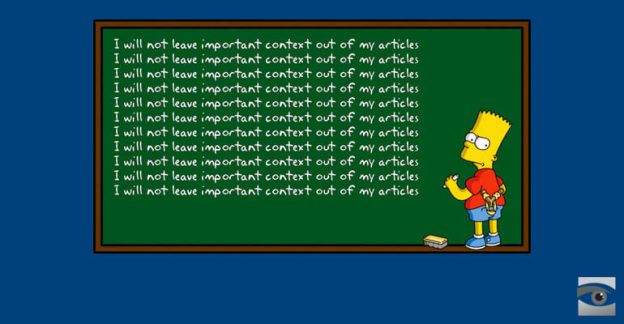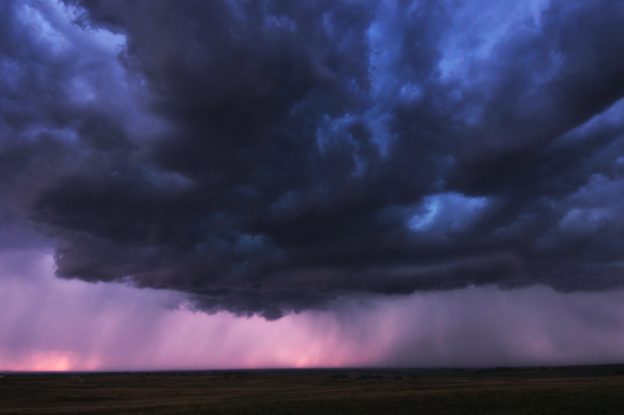Information without context is not merely useless, it can be dangerous. Context is the landscape that grants the perspective by which we can make an informed judgment. For example, if your cholesterol is 150 but you don’t know what values are bad or good, the test’s accuracy, or what your prior values were, then it is impossible to know whether this news is of concern or not. Without context we are predisposed evolutionarily to assume the worst; if you assume everything is a threat you’re more likely to live long enough to pass on your genes. However, in the modern era this instinct can be counterproductive. Making a decision without relevant information is as bad as making a decision with completely wrong information. Amputating your leg “just to be safe” upon learning you have a tumor in your foot might seem prudent absent other information. But as soon as you learn such tumors are easily removed and rarely fatal then amputation should obviously be seen as overkill. As a country (and planet to a large extent) we have similarly overreacted amidst an ocean of context-free information: we have burned our proverbial house down to rid it of termites. The response has been disproportionate to the risk precisely because the media has failed to provide the proper context. Don’t ask “how many” without also asking, “how does this compare.” Long-term side effects from Covid-19 sounds ominous, that is until you learn such long term side effects exist for the flu and many other ailments as well. Completely typical phenomena are being presented in isolation as though entirely unprecedented. Operating without context is like looking at a map with no scale: is the destination 10 ft or 100 miles? Without that informed framework to judge risk, people’s imaginations have run rampant to the point where healthy people literally believe death is all but certain if they step outside maskless. The only question left to ask: is this context-free milieu a result of intent, incompetence, or perverse incentives? A bit of all three as it turns out.
The rise of the Internet has fostered an environment where news media competition has become cutthroat. The Internet has dramatically diminished the legacy barriers to producing and distributing news content: the citizen journalist with nothing but his cell phone and a Twitter account is a force to be reckoned with now. This reality has opened the floodgates of competition. Reporting incentives now prioritize engagement and sensationalism over dispassionate objective reporting. Clicks lead to traffic and traffic justifies ad placement (incentives). To build a loyal audience many news organizations have opted to narrow rather than broaden their appeal (few but deep roots outperform the many but shallow during a drought). Focusing on ideological content maintains a stronger audience connection. In short the news has become biased, polarized, and sensationalized. This shift has created a fertile soil in which those with a personal political agenda (intent) may flourish. This shift in the news landscape has amplified an attention grabbing style of reporting known as “factual… but not truthful” otherwise known as “fake news.” It’s not fake because it’s a flat out lie, rather it is “fake” because while some parts are factually true there are omissions of crucial facts – facts that give the story the proper context needed to get the whole picture. Not volunteering information is not “lying” so when caught in their subterfuge they can plausibly hand wave it away as a simple “mistake” or “oversight.” This factual omission is a mix of laziness/incompetence or a deliberate agenda to craft a specific narrative. When this occurs in other countries we call it propaganda. When it happens here we whistle past the graveyard.
A fanciful example of factual but not truthful would be “Local shop owner refuses to sell steak to illegal aliens!” – this would be factually true, however the story is omitting the additional detail that the store had run out of steak the prior day. The reader is left with the implicit message that the storeowner is a racist jerk. Whenever the narrative reinforces a reader’s preconceptions no further scrutiny is warranted in his mind. This is a common tactic to impugn political adversaries; report words out of context, often omitting a follow up sentence that contradicts the implication of the headline (Google “fine people hoax + Scott Adams”).
This same level of “factual but not truthful” reporting has infected nearly all of the corporate media’s reporting on the Covid-19 pandemic. As a result Americans are dramatically overestimating their risk of death. A recent survey revealed that people believe those aged 44 and younger account for 30% of deaths; the actual figure is 2.6%. Further, Americans overestimated the risk of death for those under 24 by 50-fold. As of October 21 a scant 437 people aged 24 and below have died from Covid-19 in the US. The cumulative risk for that group is 1 death per 236,000. This is on par with the one-year odds of dying by falling down stairs. “Oh but they could spread it to the teachers!” Ok. Some more context. Those aged 25-64 have a 1 in 2,500 chance of dying from Covid – this is in fact the same risk prior to Covid of dying from any respiratory disease. In other words their risk profile has not changed. But even these numbers don’t tell the whole picture. These numbers are averages. The risk is heterogeneous, not homogenous. Unless you have multiple comorbidities your risk is far lower than whatever average is shown for your age demographic.
For those still worried even at 2,500 to 1 imagine the following: there are 2,500 doors lined up and you have one chance to open the correct door to reveal the grand prize. When considered in terms of something desired (the prize) this seems almost hopeless, right? But curiously if we merely flip from prize to punishment (death) we suddenly feel like it’s almost certain we will pick the wrong door on the first try. This inability to rationally assess risk leads to these foolish egocentric displays of “die ins” by teachers at various schools and universities. Odd. We’re told masks “work” so I can’t imagine what they are concerned about.
Even though the young face almost no risk from Covid (indeed, 2017-2018 flu deaths are 5x the current Covid deaths for those under 17) there is a much deadlier threat wending its way toward our youth if we do not return to normal as quickly as possible. One would think if there were a looming threat that might kill hundreds of thousands of young people this would be headline-making news. Instead we get crickets. To what do I refer? The CDC reported in June that in the prior month an astounding 25% of respondents aged 18-24 reported seriously considered suicide. To put that in context, the normal range is 7-11% — over the prior 12 months! For those aged 45-64 the number was only 3.8%. Clearly those making policy are immune to its impacts. Astoundingly many embrace these disruptive measures as they blithely ignore their own children who are powerless to reverse this insane course. Even if 1% followed through on their inclinations it would be over one hundred thousand dead. When compared to fewer than 400 deaths to date for that same age cohort the choice becomes clear: resume normal lives for our youth without delay. No more threats of shutting down schools. No more social distancing. No more masks. No more online classes. Childhood years are a precious resource that adults are looting from their children and squandering in a futile attempt to hold back this tide with a sponge.

